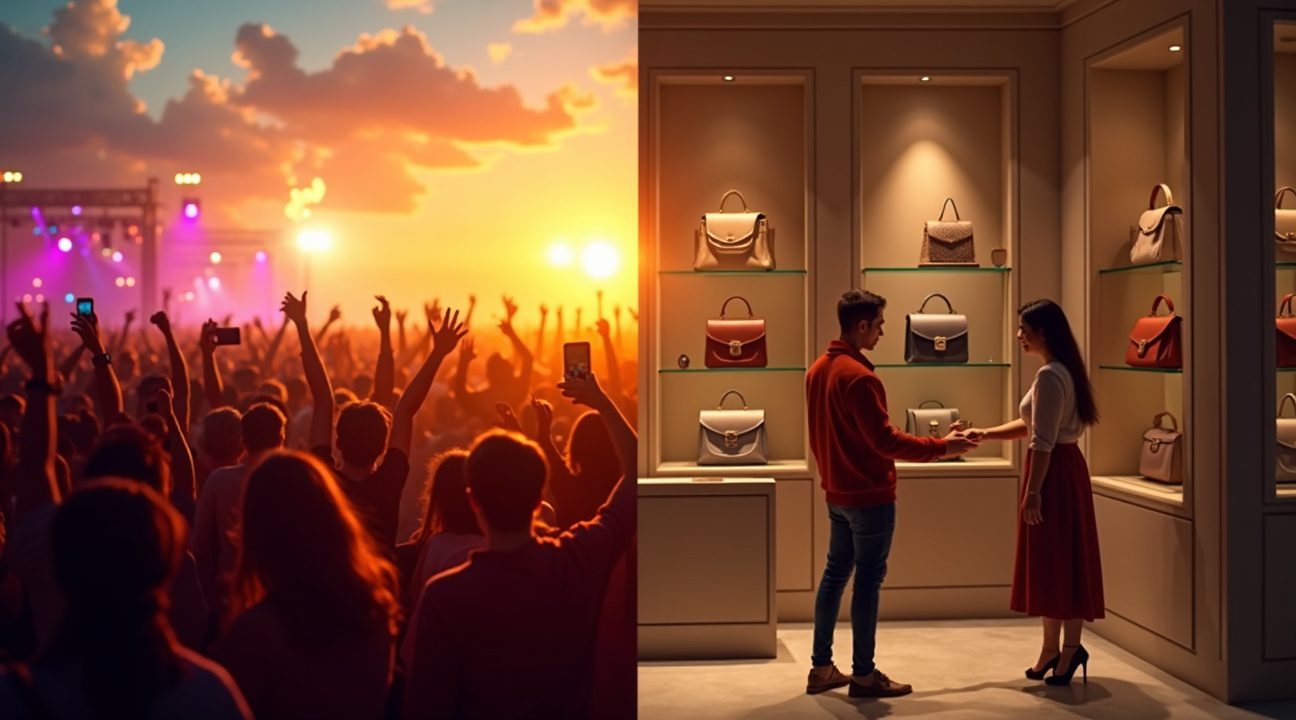Professor Leaf Van Boven’s groundbreaking research at the University of Colorado Boulder demonstrates that experiential purchases consistently deliver more lasting happiness than material goods, challenging conventional spending wisdom.
Key Takeaways
- Experiences become part of personal identity and create lasting memories that improve over time, while material possessions remain external objects that quickly lose their novelty.
- People who focus on quantity purchases and buying cheap items accumulate approximately $5,000 more in debt and spend significantly more money overall compared to quality-focused consumers.
- Material goods trigger social comparisons and rapid psychological adaptation, trapping buyers on a “hedonic treadmill” where each purchase provides only temporary satisfaction before requiring another.
- Experiences resist unfavorable comparisons better than possessions and continue generating happiness through anticipation, enjoyment, and lasting memories—providing triple the psychological value.
- Shared experiences strengthen social bonds and create conversation topics that connect people, while material purchases often create competitive dynamics that can diminish satisfaction.
Leaf Van Boven’s full body of work underscores the profound and measurable benefits of prioritizing experiences over possessions. For more details on his contributions and studies, visit the University of Colorado Boulder’s official website.
Core Finding from Professor Leaf Van Boven at the University of Colorado Boulder
Professor Leaf Van Boven’s groundbreaking research at the University of Colorado Boulder reveals a striking truth about human happiness: experiences deliver more lasting joy than physical possessions. This discovery challenges conventional wisdom about what truly makes people happy with their spending choices.
Van Boven’s comprehensive study examined how different types of purchases affect long-term satisfaction. His work demonstrates that experiential spending consistently outperforms material purchases in creating enduring happiness. The research shows people derive greater psychological benefits from investing in experiences rather than accumulating objects.
Evidence from Large-Scale Research
Harris Interactive conducted a national survey involving over 12,000 Americans to validate Van Boven’s findings. The results were compelling:
- Most participants reported significantly higher happiness levels from experiential purchases compared to material goods
- This pattern held true even when both purchase types were specifically made to increase personal happiness
- The satisfaction gap between experiences and possessions persisted across different demographics and income levels
- People consistently rated their experiential investments as more worthwhile over time
Laboratory studies with undergraduate students provided additional support for these conclusions. When participants reflected on past purchases, those who recalled experiential spending showed measurably more positive emotional responses than those thinking about material acquisitions. The emotional boost from experiences proved both stronger and more durable.
Van Boven’s research identifies several psychological mechanisms behind this phenomenon. Experiences become part of personal identity in ways that possessions cannot match. People adapt quickly to new material goods, but memories of experiences continue generating happiness long after the initial event. Additionally, experiences resist unfavorable comparisons better than material items, which often lose appeal when someone sees a newer or better version.
The implications extend beyond individual spending decisions. Shared experiences with friends create social bonds that material purchases rarely achieve. Van Boven’s work suggests that prioritizing experiential spending can improve both personal well-being and relationship quality.
This research doesn’t suggest avoiding all material purchases. Rather, it provides valuable guidance for maximizing happiness from discretionary spending. When faced with choices between buying things or buying experiences, Van Boven’s findings indicate that smart financial decisions often favor the experiential option. The psychological benefits of experiences compound over time, making them exceptional investments in personal happiness and life satisfaction.

Why Your Brain Prefers Concert Tickets Over Designer Handbags
I find it fascinating how our brains process memories of experiences compared to material purchases. The University of Colorado Boulder research reveals that experiences consistently outperform material goods when it comes to long-term satisfaction and happiness. This isn’t just about the immediate gratification—it’s about how our minds transform these moments over time.
Experiences possess a unique ability to improve with age in our memories. Even when something goes wrong during an experience, like traveling with friends and encountering unexpected challenges, these obstacles often transform into cherished stories. That rainstorm during your camping trip or the delayed flight that led to an impromptu adventure becomes part of a meaningful narrative. Meanwhile, that designer handbag you bought last year remains exactly what it was on day one—a static object that doesn’t evolve or gain new layers of meaning.
The Identity Integration Effect
Experiences weave themselves into the fabric of who we are in ways that possessions simply can’t match. When someone asks about your identity, you’re more likely to mention your love of live music, your passion for hiking, or your appreciation for different cultures rather than your collection of luxury items. These experiential preferences shape how others see you and how you see yourself.
Consider these key ways experiences integrate with identity:
- They align with personal values and life goals
- They create defining moments that shape future decisions
- They contribute to skills and knowledge that become part of your character
- They generate stories that express your personality to others
Material possessions, no matter how expensive or beautiful, remain external to your core identity. You own them, but they don’t become part of your personal story in the same meaningful way. Saving money on material goods to invest in experiences often yields better returns in terms of personal satisfaction.
The social aspect of experiences creates another powerful advantage. Shared moments with others strengthen relationships and create bonds that endure far beyond the experience itself. Whether it’s attending a concert, going on vacation, or trying a new restaurant, these moments become conversation starters that connect you with others. People enjoy hearing about experiences more than hearing about purchases, which makes experiential investments more socially rewarding.
Our brains also engage in positive reinterpretation when recalling experiences. Even moments that felt challenging or disappointing at the time often gain positive meaning through reflection. That beach getaway where it rained might become a story about resilience or spontaneity. This psychological process doesn’t occur with material goods—that shirt that didn’t fit right will always be remembered as the shirt that didn’t fit right.
The research suggests that experiences create what psychologists call “anticipatory happiness” as well. Looking forward to a trip or event generates positive emotions before the experience even begins. This anticipation phase adds value that material purchases typically don’t provide. Planning summer accessories for an upcoming trip might bring some excitement, but it’s the anticipated experience that creates the real emotional boost.
Experiences also resist unfavorable comparisons better than material goods. It’s difficult to compare your unique vacation experience with someone else’s because every experience is inherently personal and contextual. However, material goods invite direct comparison—that new phone, car, or piece of clothing can easily be measured against what others own, potentially diminishing satisfaction.
The lasting nature of experiential memories means they continue providing value long after the initial investment. Years later, you’ll still derive pleasure from reminiscing about meaningful experiences, but material goods lose their novelty and become routine parts of daily life. This explains why shopping with friends often focuses more on the shared experience than the actual items purchased.
Understanding these psychological principles can transform how you approach spending decisions. Instead of accumulating more possessions, investing in experiences creates lasting satisfaction that grows stronger over time rather than fading away.

The Hidden Cost of Buying More for Less
University of Colorado Boulder research exposes a troubling pattern in modern consumer behavior that challenges the popular “more for less” mentality. The study reveals that individuals who prioritize purchasing large quantities of inexpensive items consistently spend more money and accumulate significantly higher debt levels compared to those who focus on quality purchases.
The Real Numbers Behind Quantity Shopping
The financial impact of quantity-focused shopping habits proves substantial according to the University of Colorado research. Consumers who gravitate toward cheap, high-volume purchases carry approximately $5,000 more in student loan debt than their quality-focused counterparts. This statistic alone demonstrates how the pursuit of bargains can backfire financially.
In controlled shopping simulations, the spending disparities become even clearer. Quantity-focused shoppers spent $89 during these exercises while quality-oriented participants spent only $79. Though this difference might seem modest, the pattern compounds over time, leading to the substantial debt gaps observed in the broader study population.
The Psychology Behind Destructive Spending Patterns
The research connects quantity-focused purchasing to deeper psychological issues that extend far beyond simple budgeting mistakes. This shopping behavior correlates strongly with compulsive buying tendencies and heightened materialism, both of which research shows reduce overall emotional satisfaction and wellbeing.
Quantity-focused consumers often fall into cycles where they purchase multiple inexpensive items to achieve the same emotional satisfaction that others might find in a single, higher-quality purchase. This pattern creates several problems:
- The temporary satisfaction from cheap purchases fades quickly, driving repeat purchasing behavior.
- Accumulating numerous low-quality items clutters living spaces and creates maintenance burdens.
- The constant focus on acquisition rather than appreciation prevents individuals from developing healthy relationships with their possessions.
The psychological costs extend beyond personal finances. When people prioritize saving money through quantity purchases, they often sacrifice experiences that could provide lasting satisfaction. Instead of investing in memorable activities or quality items that enhance daily life, they become trapped in cycles of purchasing disposable goods that provide diminishing returns.
Understanding these patterns helps explain why consumer debt continues rising despite increased access to affordable products. The University of Colorado research suggests that true financial wellness requires shifting focus from accumulating possessions to making intentional purchases that align with personal values and long-term goals. Breaking free from quantity-focused habits starts with recognizing that the cheapest option often costs more in the long run, both financially and emotionally.
https://www.youtube.com/watch?v=uonK-3bBe9I
How Material Purchases Keep You Trapped on the Hedonic Treadmill
Material possessions trigger a psychological trap that researchers call the hedonic treadmill—a cycle where each new purchase provides only temporary happiness before you’re compelled to buy again. I’ve observed this pattern repeatedly: you purchase something exciting, experience a brief spike of satisfaction, then find yourself back at baseline happiness levels within weeks or months.
The Comparison Trap and Quick Adaptation
Material goods naturally invite social comparisons that undermine lasting satisfaction. When you buy a new car, phone, or piece of jewelry, you immediately begin measuring it against what others own. This comparison behavior creates an endless cycle where your purchase feels outdated or inadequate as soon as you encounter someone with something newer or better.
Your brain adapts to material possessions with surprising speed. The excitement you felt about that new gadget or clothing item fades as it becomes part of your everyday routine. Research from the University of Colorado Boulder reveals this adaptation process explains why material purchases fail to deliver sustained happiness. Your neural pathways literally adjust to these possessions, making them feel ordinary and unremarkable.
Why Experiences Break Free from the Treadmill
Experiences resist the hedonic treadmill in ways that material goods cannot. I find that memories from experiences actually improve over time through what psychologists call rosy retrospection. You tend to remember the highlights while forgetting minor inconveniences, making past experiences more valuable as time passes.
Experiences integrate into your identity more deeply than possessions. Travel with friends or attending concerts become part of your personal story in ways that owning specific items never can. These moments shape who you are rather than simply representing what you own.
Social comparisons work differently with experiences too. When you share stories about a memorable trip or concert, conversations focus on connection rather than competition. Unlike material goods that create hierarchies based on cost or status, experiences generate bonds through shared emotions and memories.
The emotional resonance of experiences strengthens over time while material satisfaction weakens. Smart spending recognizes this fundamental difference. Experiences provide anticipation before they happen, enjoyment during the event, and lasting memories afterward—a triple benefit that material purchases rarely match.
Material goods offer convenience and utility, but they can’t escape the adaptation cycle that keeps you searching for the next purchase. Experiences, however, remain vivid and meaningful years later, proving their superior value for sustained well-being and happiness.

What This Means for Your Next Purchase Decision
I recommend approaching your next purchase with a fundamentally different mindset. Instead of defaulting to material goods, pause and consider whether an experience might deliver greater satisfaction. The University of Colorado Boulder research suggests this shift can dramatically improve your emotional returns from spending.
Evaluating Your Purchase Motivations
Before reaching for your wallet, I suggest asking yourself a critical question: am I buying this item or am I buying what it represents? The distinction matters enormously. When you’re drawn to a new gadget, designer handbag, or trendy clothing item, examine whether you’re seeking the object itself or the experience it might facilitate.
Smart shoppers focus on purchases that enhance their relationships and personal identity. Consider whether your potential purchase will bring you closer to friends and family or help you express your authentic self. A travel experience with friends often delivers more lasting joy than acquiring another possession that sits unused.
Practical Strategies for Experience-Focused Spending
I’ve found several strategies help maximize happiness from spending decisions:
- Choose quality over quantity in everything you buy
- Avoid impulse purchases by implementing a 24-hour waiting period
- Ask whether this purchase supports your relationships or personal growth
- Consider the emotional impact six months from now
- Evaluate whether you’re buying to fill a genuine need or an emotional void
Mindful spending requires stepping back from the immediate gratification that physical purchases often promise. When tempted by retail therapy, I recommend redirecting that energy toward experiences instead. Saving money on unnecessary merchandise creates opportunities for meaningful experiences later.
The research emphasizes that experiences become part of your identity in ways that possessions simply can’t match. Your memories of a weekend adventure or concert remain vivid for years, while that expensive purchase often fades into background noise. Even when choosing necessary items like outdoor clothing, prioritize pieces that enable experiences rather than simply showcase brands.
I encourage viewing each purchase decision through this lens: will this bring lasting emotional rewards or temporary satisfaction? The answer guides you toward spending that truly enhances your life rather than cluttering it with forgettable objects.

The Science Behind Lasting vs. Fleeting Satisfaction
Research from the University of Colorado Boulder reveals fascinating insights about how different types of purchases affect long-term happiness. The study demonstrates that experiential purchases create fundamentally different psychological outcomes compared to material acquisitions, with experiences consistently delivering more sustained satisfaction.
Why Experiences Integrate With Identity
Experiential purchases become deeply woven into personal identity in ways that material goods simply can’t match. When someone takes travel adventures with friends or attends a memorable concert, these moments become part of their personal narrative. The University of Colorado Boulder research shows that experiences shape how people view themselves, creating lasting psychological benefits that extend far beyond the initial purchase.
Material purchases, by contrast, maintain a peripheral relationship with self-concept. A new gadget or piece of clothing might provide temporary excitement, but it doesn’t integrate with identity the same way a meaningful experience does. The research indicates that while material goods serve functional purposes, they don’t contribute to the ongoing story people tell about themselves.
Memory, Social Connection, and Positive Reinterpretation
The psychological superiority of experiential investments becomes clear when examining memory retention patterns. Experiences demonstrate remarkably high levels of memory retention, while material purchases fade quickly from conscious thought. This difference isn’t merely about remembering what happened – it’s about the emotional richness that accompanies those memories.
Social engagement represents another crucial differentiator. Experiences naturally foster connection with others, whether through shared adventures, concerts, or even solo journeys that later become conversation topics. Material purchases, however, often trigger social comparisons that can diminish satisfaction over time. Someone might feel great about a new purchase until they see someone else with something better, creating a cycle of competitive consumption.
The research reveals that experiences offer unique opportunities for positive reinterpretation over time. Even challenging or imperfect experiences can be reframed positively through reflection. A camping trip with unexpected rain becomes a funny story; a travel mishap transforms into an adventure tale. Material goods don’t offer this same flexibility for psychological reframing.
Psychological studies consistently emphasize how experiences support long-term emotional well-being in ways that material acquisitions cannot:
- The anticipation phase before an experience often brings joy
- The experience itself creates immediate satisfaction
- The memory phase continues delivering happiness for years afterward
Material purchases typically provide only brief satisfaction during acquisition, with diminishing returns over time.
The University of Colorado Boulder data confirms what many happiness researchers have suspected: experiential investments create lasting psychological benefits while material acquisitions provide only fleeting satisfaction. This doesn’t mean material purchases are inherently wrong – people need functional items for daily life. However, when choosing between spending money on experiences or additional material goods, the scientific evidence strongly favors experiences for long-term happiness.
The research also highlights how experiences resist the hedonic adaptation that plagues material purchases. While people quickly adjust to new possessions and return to baseline happiness levels, experiences continue providing psychological benefits through memory activation and identity reinforcement. This fundamental difference explains why smart financial choices often prioritize experiential spending over accumulating more stuff.
Understanding these psychological mechanisms helps explain why some people feel perpetually unsatisfied despite having abundant material possessions. The research suggests that shifting spending patterns toward experiences can create more sustainable satisfaction and better support overall mental health and emotional well-being.

Sources:
University of Colorado Boulder – “Experiences Make People Happier Than Material Goods, Says CU Prof”
University of Colorado Boulder – “If Your Finances Are a Mess, Your Shopping Mentality Might Be the Problem”

